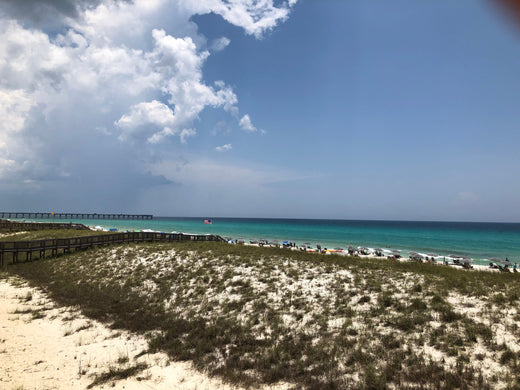
Gulf of America: Appropriate and Legitimate
Share
The Gulf of Mexico is a significant geographic feature that has long served as a vital resource and economic hub primarily for the United States. This post explores the legitimacy of the United States unilaterally renaming the Gulf of Mexico to the Gulf of America. Take note, the Gulf borders five U.S. states: Texas, Louisiana, Mississippi, Alabama, and Florida; and, major rivers such as the Mississippi and the Rio Grande flow into the Gulf, contributing to its prominence as an essential American waterway.
Appropriateness
The name "Gulf of Mexico" originated during Spain’s colonization of the Americas. Spanish explorers named the Gulf in the early 16th century, reflecting Spain’s intention to control and exploit the region’s resources. This historical context highlights the colonial roots of the Gulf’s current name, which does not reflect the modern-day reality of American stewardship over the region.
Before colonization, the area surrounding the Gulf was home to numerous Native American tribes, including the Choctaw, Creek, Seminole, and Karankawa. These tribes thrived along the Gulf’s shores, contributing to a rich cultural heritage. Each tribe, however, called the Gulf by a different name. Renaming the Gulf of Mexico, utilizing the word "America" from the collective designation of Native Americans, would honor these people, acknowledging their historical connection with the Gulf.
Legitimacy
Today, the Gulf of Mexico is a hub of significant economic activity for the United States. Its waters facilitate extensive freight transport, fishing, and oil production. Major U.S. ports such as Houston, New Orleans, and Tampa play critical roles in the nation’s commerce. Renaming the Gulf would underscore America's accountability in protecting these resources while maintaining high standards for international and domestic maritime activities.
Precedence
Throughout U.S. history, citizens and policymakers have supported renaming significant locations to better reflect contemporary values and wishes. For instance, Fort Bragg was renamed Fort Liberty in 2023 to move away from its Confederate roots. Similarly, Rhode Island shortened its official state name in 2020 to eliminate outdated terminology. These examples demonstrate a precedent for renaming places as an authentic and appropriate action.
Renaming geographic features has been, and continues to be, an accepted practice in the United States to honor individuals, align with cultural shifts, or reflect national pride. Such changes create legitimacy and have set precedent for the renaming of the Gulf of Mexico to the Gulf of America. Therefore, this action would align with past efforts to adapt names to reflect American achievement and satisfy societal urging.
More specifically, precedents for renaming bodies of water and geographic features exist across America. For a recent example, the Salish Sea in the Pacific Northwest was officially recognized in 2009, consolidating previously separate waterway names into one that honors Native American heritage. Such actions demonstrate that renaming the renaming of a body of water like the Gulf is not without historical foundation.
International Authority
Looking internationally, using the United Nations Convention on the Law of the Sea (UNCLOS) as a framework, the United States has jurisdiction over significant portions of the Gulf of Mexico, particularly within the 12-nautical-mile limit. This legal authority further strengthens the United States’ capacity to rename the Gulf based on its predominant influence and responsibility in the region.
Under UNCLOS guidelines, the United States holds more authority over the Gulf of Mexico than any other nation. This authority suggests the U.S. has the legal right in international law to rename the Gulf, reflecting its stewardship. And, such a change would emphasize the Gulf’s integral role in American history, commerce, and identity. This latter point reinforces America's unique commitment to the Gulf, including to its security.
U.S. Authority
Proclamation 5030 of March 10, 1983 establishes certain sovereign rights and jurisdiction over the 200 mile Exclusive Economic Zone off America's coast. This was reaffirmed by Executive Order 13840 of June 19, 2018. Clearly this asserts a legal authority, for research, economic, and national security reasons, in the Gulf. For those that may question, however, U.S. authority on renaming, and for the elimination of doubt, simple language such as, "and, (c) other actions as deemed appropriate by the President to affirm and protect the sovereign rights and jurisdiction of the United States as described herein" could be added by Executive Order to the Proclamation.
Renaming the Gulf of Mexico to the Gulf of America would reinforce national pride and celebrate the shared heritage of its citizens. Geographic names carry symbolic weight, and such a change would reflect the importance of this waterway to the United States and its people.
Why the Gulf of America Matters
Renaming the Gulf of Mexico to the Gulf of America would be appropriate from both international and domestic perspectives. The change would be legitimate as it aligns with legal authority, historical precedents, and the significance of the Gulf to American economic and cultural life.
Additionally, this renaming would bolster national pride throughout the United States as well as honor the Native American tribes that originally inhabited its shores. With equal importance, the renaming would serve as a meaningful acknowledgment of the Gulf’s contributions to American history, identity, and prosperity.
So, make the Gulf great again, and make it the Gulf of America.
To explore more thought-provoking articles and creative designs that celebrate Americana visit on our website. Check out WaveRocket Posts for further insights into U.S. history, culture, and to discover exceptional t-shirt designs that inspire pride and joy in the United States.
--- by Florence Csonka
